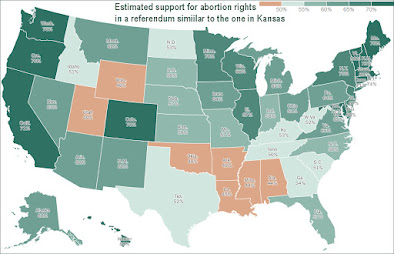 |
| New York Times map; click the image to enlarge it. |
Many Republicans and rural residents rejected the proposed constitutional amendment. "Despite red-and-blue maps suggesting that the political fault line of our era runs between urban and rural areas, much of the countryside joined cities like Wichita and Kansas City in voting down the amendment," native Kansan Sara Smarsh writes for the Times. "Fourteen Kansas counties that went for Mr. Trump in the 2020 presidential election, as well as all five that went for Joe Biden, saw majority votes against the amendment. Even in counties where most voted yes, sizable numbers voted no."
More than 463,000 Republicans voted in the U.S. Senate race and more than 451,000 in the gubernatorial race, but the amendment only got around 375,000 votes; that means Republicans who showed up to vote for the other races either voted against the amendment or left it blank. Kansas has a closed primary, but all registered voters could vote on the amendment.
Some conservatives said they rejected the amendment because they remembered how dangerous it was for women before abortion was legal. Another possible reason: "Abortion-rights supporters used conservative-sounding language about government mandates and personal freedom in their pitch to voters, and made a point of reaching out to independents, Libertarians and moderate Republicans," Mitch Smith, Lauren Fox and Elizabeth Dias report for the Times.
 |
| NYT map, adapted by The Rural Blog, of its estimates; click on it to enlarge. |
More broadly, "Both Republicans and Democrats caution against conflating the results of an up-or-down ballot question with how Americans will vote in November, when they will be weighing a long list of issues, personalities and their views of Democratic control of Washington," Glueck and Goldmacher report. However, "a Kaiser Family Foundation poll released this week showed that the issue of abortion access had become more salient for women 18 to 49 years old, with a 14-percentage-point jump since February for those who say it will be very important to their vote in midterm elections, up to 73%. That is roughly equal to the share of voters overall who said inflation would be very important this fall — and a sign of how animating abortion has become for many women."
No comments:
Post a Comment